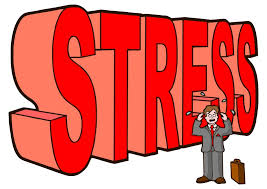Stress is defined as “the pattern of responses an organism makes to stimulus event that disturbs the equilibrium and exceeds a person’s ability to cope.”
Whenever we hear the word stress the first image that comes to our mind is a negative one. But do you know stress is not always bad. There are two types of stress-Eustress and Distress. Yes guys stress can be positive also!! Eustress is the kind of stress that is good for us and is actually one of the best assets of a person as it helps us to achieve our goals. When this eustress turns into Distress, does it becomes a case of worry as it interferes with our daily functioning and can also prove to be really harmful for our body in the long run. Stress has also been termed as slow poison because it slowly kills the person if it is not cured at the right time. We are almost always stressed be it be due to exams, office tension, fights with our loved ones, thus its important that we know how to deal with this stress.
There following things determine our stress tolerance level:
- Individuals Support Network: Your family and friends and the entire support network act as important buffers against the life stressors. The better the support system, less likely is the person going to suffer from stress and be able to fight against it.
- Sense of control: the individuals perceived sense of control on her/his abilities acts as an important determinant of our stress tolerance level.
- Preparedness: The more prepared you are to take on the stressful situation the less likely the individuals suffers from stress.
- Outlook and attitude: Optimistic outlook and positive attitude increase the stress tolerance while pessimistic outlook and negative attitude reduces the stress tolerance.
Coping with Stress
“Coping is a dynamic situation-specific reaction to stress. It is a set of concrete responses to stressful situations or events that are intended to resolve the problem and reduce stress.”
I will be mentioning a few stress management techniques that you can use in your daily life to reduce the stress:
- Meditation: This age-old yoga technique has proven to be very helpful introducing stress. It consists of a sequence of learned techniques for refocusing of attention that brings about an altered state of consciousness, and the individual enters into another level and becomes unaware of any stimulation outside.
- Exercise: Exercise provides an outlet to any pent-up energy that is experienced during response to stress. Exercises such as walking, jogging, swimming, cycling improve the functioning of the lungs, our blood circulation, reduces body fat and maintains healthy blood pressure levels.
- Relaxation Techniques: relaxation techniques reduce symptoms of stress and decrease the incidence high blood pressure and heart disease. Usually relaxation starts from the lower part of the body and progresses up to the facial muscles in such a way that the whole body is relaxed. Deep breathing is used in collaboration with muscle relaxation to calm the mind and relax the body.
- Creative Visualisation : Creative Visualisation is an effective psychological technique for dealing with stress. It is a subjective experience that uses imagery and imagination. Before visualising one must set oneself a realistic goal, as it helps build confidence. It is easier to visualise if one’s mind is quiet, body relaxed and eyes are closed. This reduces the risk of interference from unnecessary thoughts and provides the creative energy needed for turning an imagined scene into reality.
Apart from the above mentioned techniques developing life skills such as Assertiveness, Time Management, rational thinking, avoiding procrastination also go a long way in helping us cope with stress.
Click here for government certification in Life Skills
Manage stress effectively and become a leader with Vskills certification
https://www.vskills.in/certification/management/Personal-competencies-for-Leadership-Skills




21 Comments. Leave new
True that and interesting to read.
good one 🙂
Nice Points 😀
very nicely explained article!
Amazing!
Informative article!
nice work…
He is very important to know how to cope with stress because we are living in a competitive world so if you want to be at the top we have to fight with weaknesses and one of our weakness is stress so everyone should know how to deal with it
haha eustress is what keeps us going!
Nice
Thanks so much everyone 🙂
Good job.
A much needed article
Amazing:)
True and nice work:)
Well explained, Srishti 🙂
Nice techniques explained
Great technique.. They are very helpful 🙂
Nice!!
Great work!
loved it…